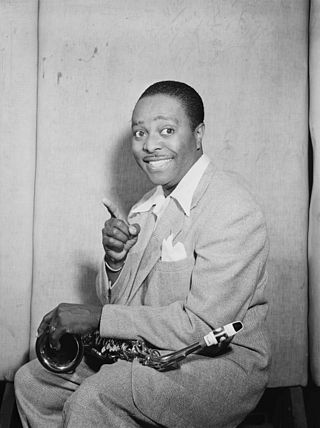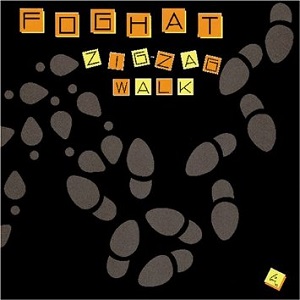Related Research Articles

"Rock Around the Clock" is a rock and roll song in the 12-bar blues format written by Max C. Freedman and James E. Myers in 1952. The best-known and most successful rendition was recorded by Bill Haley & His Comets in 1954 for American Decca. It was a number one single for two months and did well on the United Kingdom charts; the recording also reentered the UK Singles Chart in the 1960s and 1970s.

Bill Haley & His Comets was an American rock and roll band formed in 1947 and continuing until Haley's death in 1981. The band was also known as Bill Haley and the Comets and Bill Haley's Comets. From late 1954 to late 1956, the group recorded nine Top 20 singles, one of which was number one and three that were Top Ten. The single "Rock Around the Clock" was the best-selling rock single in the history of the genre and maintained that position for several years.
This is a list of notable events in music that took place in the year 1946.

Louis Thomas Jordan was an American saxophonist, multi-instrumentalist, songwriter and bandleader who was popular from the late 1930s to the early 1950s. Known as "the King of the Jukebox", he earned his highest profile towards the end of the swing era. He was inducted into the Rock and Roll Hall of Fame in 1987 as an "early influence".

Asleep at the Wheel is an American Western Swing music group that was formed in Paw Paw, West Virginia in 1970, and is based in Austin, Texas. The band has won nine Grammy Awards, released over twenty albums, and has charted more than 21 singles on the Billboard country charts. Their highest-charting single, "The Letter That Johnny Walker Read", peaked at No. 10 in 1975.

Milton Gabler was an American record producer, responsible for many innovations in the recording industry of the 20th century. These included being the first person to deal in record reissues, the first to sell records by mail order, and the first to credit all the musicians on the recordings.
"Saturday Night Fish Fry" is a jump blues song written by Louis Jordan and Ellis Lawrence Walsh, best known through the version recorded by Louis Jordan and His Tympany Five. The recording is considered to be one of the "excellent and commercially successful" examples of the jump blues genre.

Let the Good Times Roll: The Music of Louis Jordan is the thirty seventh studio album by B. B. King, released in 1999. It is a tribute album to jazz saxophonist and singer Louis Jordan, and is made up entirely of covers of songs written or performed by Jordan. The album was released in 1999 on MCA Records.

Rock 'n Roll Stage Show is the first studio album and fourth overall album by rock and roll band Bill Haley and His Comets. Released by Decca Records in August 1956, it was the group's first album to include new, as opposed to previously released material. Although the album spawned several singles, it also featured several album-only tracks.

Rockin' Around the World was the sixth album of rock and roll music by Bill Haley and His Comets. Released in March 1958 on the Decca Records label, Decca 8692, the album was produced by Milt Gabler, who produced all of Haley's recordings for Decca. It was the second of three "themed" albums that Haley produced for the label. This album featured versions of well-known folk songs from around the world, rearranged in rock and roll style, including new lyrics, by Haley and his songwriting partners, Milt Gabler, Rusty Keefer, and Catherine Cafra. It is not known how much, if any, input Haley himself had into the writing process.

Bill Haley's Chicks was the eighth album of rock and roll recordings by Bill Haley & His Comets for Decca Records, Decca 8821. Released in January 1959 and produced by Milt Gabler, the album was the third "theme" album Haley recorded for Decca, following Rockin' the Oldies and Rockin' Around the World. This album is built on the theme of women's names, with each song being about a different girl. Included on the album is "Skinny Minnie", which was a major hit for the band in 1958, reaching no.22 on Billboard and no.25 on Cashbox, along with a mixture of originals and cover versions of standards and jazz songs. "Lean Jean", a song musically and thematically almost identical to "Skinny Minnie", also charted in 1958, reaching no. 52 on Cashbox. The song "B.B. Betty", co-written by Bill Haley and released as a Decca 45 single, featured a solo vocal by Haley's steel guitar player, Billy Williamson.

Recorded over the span of more than 18 months, Strictly Instrumental was the ninth rock and roll album by Bill Haley & His Comets, and their final album of new material for Decca Records. Produced by Milt Gabler, the album collects instrumental recordings made by Haley and the Comets between June 1958 and their final Decca recording sessions in September 1959.

All Aboard! is the twenty-sixth and final studio album by American singer-songwriter John Denver, released in August 1997. Denver died in a plane crash two months after its release.

Lucky Oceans is an American pedal steel guitarist and a former member of country and Western swing band Asleep at the Wheel. From 1995 to 2017 he was a broadcaster in Perth, Western Australia with the Australian Broadcasting Corporation.

Zig-Zag Walk is the twelfth studio album by British hard rock band Foghat, released in 1983. Unlike the previous year's In the Mood for Something Rude, which consisted of all outside material, lead singer Dave Peverett wrote five of the album's ten songs, with guitarist Erik Cartwright contributing a sixth. A few of the songs are given a rockabilly treatment augmenting the blues rock the band is better known for. It would be the band's last album for over a decade until their comeback album, Return of the Boogie Men, in 1994.
Louis Jordan was an American popular music innovator who recorded from the 1930s until the 1970s. During the 1940s, he was the most popular recording artist of the soon-to-be-called rhythm and blues music. Jordan had eighteen No. 1 hits, which places him as the third most successful singles artist in Billboard R&B charts history. His 1946 recording of "Choo Choo Ch'Boogie" is tied for second place for spending the most weeks (eighteen) at No. 1. Jordan's success was not limited to the R&B market — he also had No. 1 hits on the Billboard Pop and Country charts.

"Two Hound Dogs" is a 1955 rock and roll song composed by Bill Haley and Frank Pingatore. The song was released as a Decca single by Bill Haley and His Comets. The Decca single peaked at #31 on the Cash Box singles chart.

Asleep at the Wheel is the second album by American western swing band Asleep at the Wheel. Produced by Norro Wilson at Columbia Studio B in Nashville, Tennessee, it was released in September 1974 as the group's first album on Epic Records. As with its predecessor Comin' Right at Ya, Asleep at the Wheel's self-titled album featured a mix of traditional and original compositions, including songs written by popular country musicians Rex Griffin, Cindy Walker and Hank Penny.

George Vaughn Horton was an American songwriter and performer. Usually credited as "Vaughn Horton" or "George Vaughn", he wrote or contributed to the success of a number of popular songs, including "Choo Choo Ch'Boogie", "Hillbilly Fever", "Sugar-Foot Rag", "Mockin' Bird Hill" and the Christmas song "Jolly Old Saint Nicholas".
Denver Darling was an American country music performer and songwriter. He is best known for his patriotic songs of the World War II era and for his writing credit on Louis Jordan's Choo Choo Ch'Boogie.
References
- ↑ Whitburn, Joel (2004). Top R&B/Hip-Hop Singles: 1942-2004. Record Research. p. 309.
- 1 2 Gilliland, John (1994). Pop Chronicles the 40s: The Lively Story of Pop Music in the 40s (audiobook). ISBN 978-1-55935-147-8. OCLC 31611854. Tape 4, side A.
- ↑ Richard Carlin, Country Music: A Biographical Dictionary, p. 96
- ↑ Vaughn and Roy Horton at Country Music Hall of Fame Archived 2007-07-23 at the Wayback Machine
- ↑ "Bill Haley: Discography". Allmusic . Retrieved 2009-05-29.
- 1 2 Allen, James. "Asleep at the Wheel –Review". AllMusic . Retrieved January 12, 2023.